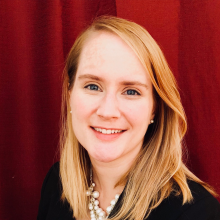May 2018 Spotlight on the SRCD Policy Fellow: Anne Day Leong, Ph.D., M.S.W.
2017-2018 Federal Executive Branch Policy Fellow
I pursued the SRCD fellowship as an opportunity to work at the intersection of science and policy with a focus on children. The fellowship fit perfectly into my career by allowing me to bring together my experience in social work with children and families, social science research, and policies impacting children.
My fellowship is hosted at the National Institutes of Health, in the Eunice Kennedy Shriver National Institute of Child Health and Human Development (NICHD), with the Office of Science Policy, Reporting, and Program Analysis and the Office of Legislation and Public Policy. NICHD is one of the 27 Institutes and Centers within the National Institutes of Health (NIH). As the name implies, NICHD conducts and funds research on the health and wellbeing of children and mothers. NICHD also conducts and funds research on genetic disorders, reproductive health, pregnancy and lactation, gynecologic health, maternal health and much more.
As a social worker and social scientist, transitioning to a biomedical research institution, like NIH, presented a significant learning curve. I intentionally chose to complete my fellowship at NIH because I wanted to challenge myself to expand my knowledge into new areas – and I got exactly what I was looking for. In my time at NIH, I have been exposed to the biomedical aspects of many topics that I have studied from a social science perspective. I’ve had the opportunity to learn about topics such as children born to opioid addicted mothers, how violence impacts children, and early childhood exposure to technology. At times, the learning curve has been steep, but ultimately, it has lead me to knowledge that I wouldn’t have gained without my time at NIH.
One of my roles at NICHD’s Office of Legislation and Public Policy has been at the intersection of science and policy. I frequently attend hearings and briefings on Capitol Hill to bring information around policy needs and upcoming policy changes back to NICHD. I also translate science to policy through providing technical assistance and subject matter expertise on draft legislation. My experience at the Office of Legislation and Public Policy has really allowed me to see and experience the process of producing evidence-based policies.
At the Office of Science Policy, Reporting, and Program Analysis (OSPRA) I am able to help shape the research agenda at NICHD through analysis and strategic planning. I have assisted in analyzing research funded by NICHD on a number of topics ranging from muscular dystrophy to fragile X syndrome. That analysis aims to better understand what has been accomplished in the research and what topic areas should be priorities in the future. I am also involved in the ongoing process of analyzing NICHD’s accomplishments and the needs of the field for the ongoing strategic planning process. The strategic plan will culminate in a report that will outline NICHD’s research priorities and plans to address the rapidly changing challenges in the field.
I have had the opportunity to spend some time working outside of NICHD, with the NIH Office of Research on Women’s Health (ORWH) on their strategic plan. ORWH works in partnership with the NIH Institutes and Centers, as well as other agencies and offices within the U.S. Department of Health and Human Services, to advance the health of women. I am assisting ORWH in its strategic planning process by helping to establish a method of evaluating the strategic plan’s impact. I am helping to build specific metrics, as well as a framework for evaluation. ORWH is interested in ensuring that its strategic plan is based on measurable goals that allow for an ongoing analysis of its effectiveness.
My time at NIH has allowed me the opportunity to really experience the intersection of policy and science at the federal level. This opportunity has allowed me to expand my knowledge around children, families, and public policy through hands on experience. I am immensely grateful for the opportunities NIH and SRCD have given me and I look forward to seeing what comes next.
